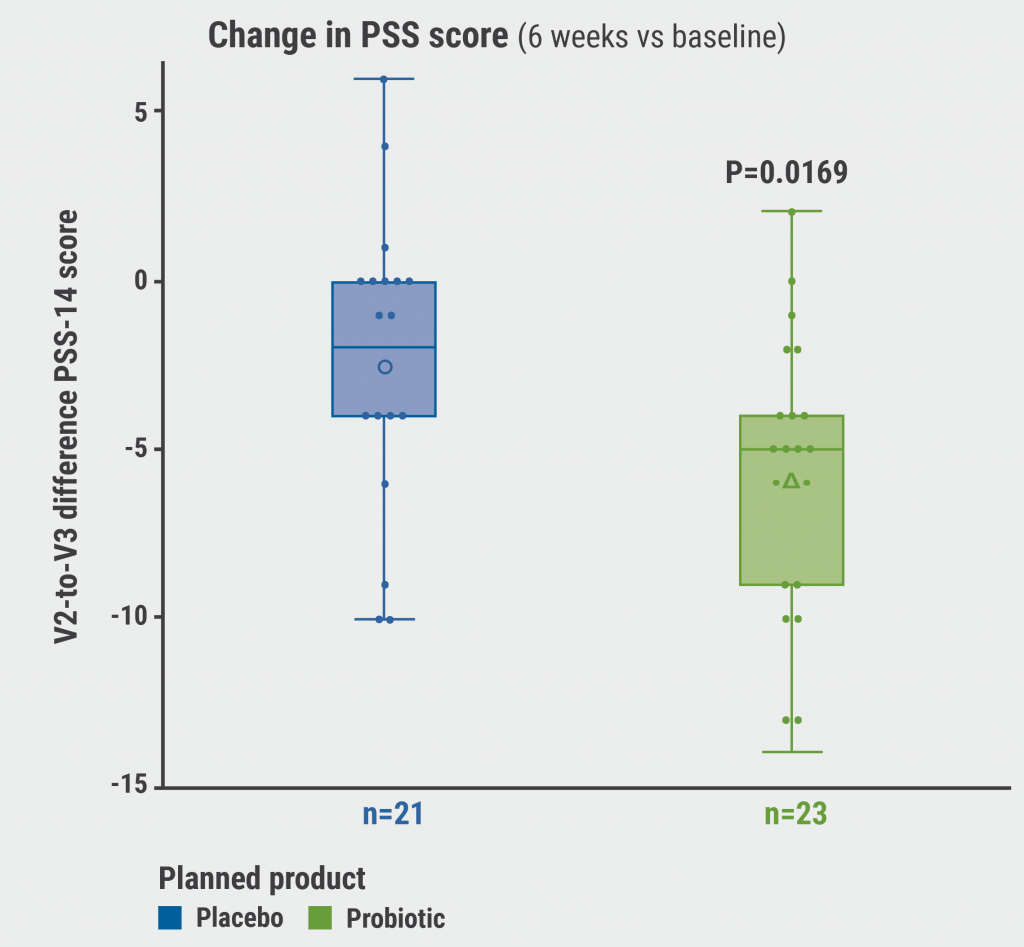https://doi.org/10.55788/0da619d5
There is growing evidence that dietary patterns are linked to mental disorders, including depression, stress, and anxiety, and the gut microbiome is recognised as a contributing factor in this association [1,2]. Targeting the gut microbiota with probiotics, like Bifidobacterium longum NCC3001, has shown to decrease anxiety in an animal model and to improve depressive symptoms in patients with irritable bowel syndrome [3,4]. Dr Julie Hudry (Nestlé Institute of Health Science, Switzerland) presented results from a randomised, double-blind, placebo-controlled trial aiming to evaluate the efficacy of B. longum NCC3001 in improving mental health in healthy but stressed adults [5].
A total of 49 participants ages 25–65 years were randomised 1:1 to ingest the probiotic B. longum NCC3001 (1010 CFU, once daily) or placebo for 6 weeks. Stress levels at baseline were monitored using the self-reported Depression Anxiety and Stress Scale (DASS)-42 score. All participants had mild-to-moderate stress at baseline. At baseline and after 6 weeks, measurement of acute stress response (Maastricht Acute Test, MAST) was performed, as well as several general assessments regarding probiotics in stool, perceived stress, sleep quality, and anxiety.
Ingestion of the probiotic increased the abundance of B. longum NCC3001 in the gut and significantly decreased perceived stress: the median decrease in Perceived Stress Scale (PSS)-14 score was 23% in the probiotic group versus 4% in the placebo group (P=0.0169; see Figure). Ingestion of the probiotic had no significant effect on anxiety and depression scores. Of note, in this healthy population, anxiety and depression were already quite low at baseline, Dr Hudry remarked. On the other hand, on an individual level, a positive correlation was found between the reduction of perceived stress and the reduction in anxiety (r=0.32) and depression (r=0.34), and with improvements in cortisol awakening response (r=0.30).
Figure: Probiotic intervention significantly decreased perceived stress [5]

“This exploratory trial provides first insights into psychological benefits of B. longum NCC3001,” concluded Dr Hudry.
- Marx W, et al. Mol Psychiatry. 2021;26:134–150.
- Margolis KG, et al. Gasteroenterology. 2021;160:1486–1501.
- Bercik P, et al. Gasteroenterology. 2011;14:599–609.
- Pinto-Sanchez MI, et al. Gasteroenterology. 2017;15:448–459.
- Hudry J, et al. A 6-week intervention with Bifidobacterium longum NCC3001 reduces perceived stress in healthy adults: A randomized control trial. Abstract S07.02, ECNP Congress 2022, 15–18 October, Vienna, Austria.
Copyright ©2022 Medicom Medical Publishers
Posted on
Previous Article
« KarXT is effective in schizophrenic patients experiencing acute psychosis Next Article
Zuranolone shows rapid-acting efficacy in postpartum depression »
« KarXT is effective in schizophrenic patients experiencing acute psychosis Next Article
Zuranolone shows rapid-acting efficacy in postpartum depression »
Table of Contents: ECNP 2022
Featured articles
Letter from the Editor
New Medications
Zuranolone shows rapid-acting efficacy in postpartum depression
Probiotics could reduce perceived stress
KarXT is effective in schizophrenic patients experiencing acute psychosis
Low-dose ulipristal acetate is an effective treatment for PMDD
New Findings
Endogenous oxytocin release helps the mind to deal with pain
Nitric oxide synthase genetic variant is a risk factor for suicidal behaviour
Early-life gut microbiota depletion changes brain morphology and behaviour
Digital Technology
Treating intrusive memories after trauma in healthcare workers using Tetris
VR exposure as effective as in vivo exposure for phobia
Efficacy of smartphone-based treatment of bipolar disorders not (yet) validated
Psilocybin
Mode of action of psilocybin
Fast and sustained effect of 2 administrations of psilocybin on depression
Antidepressant properties of psilocybin might be related to changes in sleep
Peripartum Neurobiology
Both sex hormones and serotonin play a role in peripartum mental health
Child loss induces short- and long-term neurobiological changes
Reproductive state matters when looking at the female brain and drug treatment effects
Miscellaneous
Different brain responses to fat and/or sugar
Diabetes not related to abnormal biomarkers of Alzheimer’s disease
Oxytocin treatment induces long-lasting neurobiological adaptations in autism
Related Articles
November 2, 2020
Screening with ADHD Self-Report accurate in girls
September 30, 2020
Pre-treatment brain activation pattern tied to therapy response in OCD
November 2, 2020
No altered fractional anisotropy in ADHD
© 2024 Medicom Medical Publishers. All rights reserved. Terms and Conditions | Privacy Policy
HEAD OFFICE
Laarderhoogtweg 25
1101 EB Amsterdam
The Netherlands
T: +31 85 4012 560
E: publishers@medicom-publishers.com

